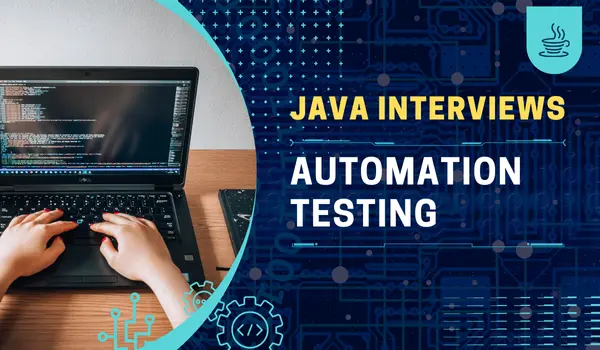
Top Java Programs for Automation Testing Interviews
Are you preparing for java programs for automation testing interviews? If so, you're probably wondering what kind of Java programs you should brush up on. Don't worry, we've got you covered!
In this blog, we'll walk you through some of the most important Java programs that often come up in automation testing interviews. We'll break them down, explain why they're important, and give you some tips on how to ace your interview.
Why Choose Java Programs for Automation Testing Interviews?
Java is a widely-used programming language that offers several advantages for automation testing:
Platform Independence: Java's "write once, run anywhere" capability allows tests to be executed on various platforms without modification.
Rich Ecosystem: With a plethora of libraries and frameworks, such as Selenium and TestNG, Java simplifies the automation process.
Strong Community Support: A large community means more resources, tutorials, and forums for troubleshooting.
Object-Oriented Features: Java's object-oriented nature helps in creating reusable test scripts, making maintenance easier.
These features make Java a preferred choice for automation testing, and understanding its core concepts is essential for interview success.

Essential Java Programs for Automation Testing
Here are some fundamental Java programs that you should be familiar with for automation testing interviews:
Palindrome Checker: This program checks if a string is a palindrome (reads the same backward as forward).
public class Palindrome {
public static void main(String[] args) {
String str = "radar";
String reversed = new StringBuilder(str).reverse().toString();
System.out.println(str.equals(reversed) ? "Palindrome" : "Not a palindrome");
}
}Fibonacci Series: This program generates the Fibonacci series up to a specified number.
public class Fibonacci {
public static void main(String[] args) {
int n = 10, a = 0, b = 1;
System.out.print("Fibonacci Series: " + a + " " + b);
for (int i = 2; i < n; i++) {
int next = a + b;
System.out.print(" " + next);
a = b;
b = next;
}
}
}
Factorial Calculation: This program calculates the factorial of a given number.
public class Factorial {
public static void main(String[] args) {
int num = 5;
int factorial = 1;
for (int i = 1; i <= num; i++) {
factorial *= i;
}
System.out.println("Factorial of " + num + " is " + factorial);
}
}Sorting an Array: This program sorts an array of integers using the bubble sort algorithm.
public class BubbleSort {
public static void main(String[] args) {
int[] arr = {5, 2, 9, 1, 5, 6};
for (int i = 0; i < arr.length - 1; i++) {
for (int j = 0; j < arr.length - i - 1; j++) {
if (arr[j] > arr[j + 1]) {
int temp = arr[j];
arr[j] = arr[j + 1];
arr[j + 1] = temp;
}
}
}
System.out.print("Sorted Array: ");
for (int num : arr) {
System.out.print(num + " ");
}
}
}Finding Prime Numbers: This program checks if a number is prime.
public class PrimeCheck {
public static void main(String[] args) {
int num = 29;
boolean isPrime = true;
for (int i = 2; i <= Math.sqrt(num); i++) {
if (num % i == 0) {
isPrime = false;
break;
}
}
System.out.println(num + " is " + (isPrime ? "a prime number" : "not a prime number"));
}
}Common Java Interview Questions Related to Automation Testing
While practicing these programs, it's also important to prepare for common interview questions. Here are a few you might encounter:
What is the difference between `==` and `equals()` in Java?
Explain the concept of method overloading and method overriding.
What are the main principles of Object-Oriented Programming (OOP)?
How do you handle exceptions in Java?
What is the significance of the `main` method in Java?
Understanding these concepts will not only help you in interviews but also in writing efficient automation scripts.
You Must Read
Top-Tier Sample Project Report of a Company [Free Template]
Tips for Preparing for Java Programs Automation Testing Interviews
Preparing for interviews can be daunting, but here are some actionable tips to help you succeed:
Practice Coding: Regularly write and execute Java programs. Websites like LeetCode and HackerRank can be great for practice.
Understand Core Concepts: Make sure you grasp the fundamentals of Java, including OOP principles, data structures, and algorithms.
Mock Interviews: Conduct mock interviews with friends or use platforms that offer mock interview services to simulate the interview environment.
Stay Updated: Keep an eye on the latest trends and updates in Java and automation testing tools.
Join Communities: Engage with online forums and communities related to Java and automation testing. This can provide support and additional resources.
Conclusion
Java plays a vital role in automation testing, and being well-versed in its programming concepts can significantly boost your confidence during interviews.
By practicing the essential Java programs and preparing for common interview questions, you will be better equipped to tackle the challenges ahead. Remember, consistent practice and a solid understanding of Java will pave the way for your success in automation testing interviews. Good luck!

About Anita Ankam
Anita Ankam – Expert Project Management Instructor
Anita Ankam is a highly experienced and certified project management instructor, specializing in globally recognized methodologies such as PMP®, PMI-ACP®, DASM®, and DASSM®. With an extensive academic background, including an MBA and MSc, Anita holds multiple industry-leading certifications, including PRINCE2, PRINCE2 Agile Practitioner, CSM, ASM, ITIL, and Six Sigma Black Belt.
As an authorized training instructor, Anita has guided countless professionals in mastering project management frameworks and agile practices. Know more.
Related Posts

Featured Links
Contact us
- PMP® Certification Course |
- CAPM Certification Course |
- PMP Certification Training in Mumbai |
- PMP Certification Training in Pune |
- PMP Certification Training in Hyderabad |
- PMP Certification Training in Delhi |
- PMP Certification Training in Chennai |
- PMP Certification Training Course in Ahmedabad |
- PMP Certification Training Course in Bangalore |
- PMP Certification Training Course in Bhubaneswar |
- PMP Certification Training Course in Chandigarh |
- PMP Certification Training Course in Gandhinagar |
- PMP Certification Training Course in Faridabad |
- PMP Certification Training Course in Dombivli |
- PMP Certification Training Course in Coimbatore |
- PMP Certification Training Course in Ghaziabad |
- PMP Certification Training Course in Gurgaon |
- PMP Certification Training Course in Indore |
- PMP Certification Training Course in Jaipur |
- PMP Certification Training Course in Mysore |
- PMP Certification Training Course in Lucknow |
- PMP Certification Training Course in Kolkata |
- PMP Certification Training Course in Kochi |
- PMP Certification Training Course in Nagpur |
- PMP Certification Training Course in Navi Mumbai |
- PMP Certification Training Course in Patna |
- PMP Certification Training Course in Pimpri |
- PMP Certification Training Course in Vadodara |
- PMP Certification Training Course in Trivandrum |
- PMP Certification Training Course in Thane |
- PMP Certification Training Course in Surat |
- PMP Certification Training Course in Noida |
- PMP Certification Training Course in Visakhapatnam |
- PMP® Certification Training Course in Doha |
- PMP Certification Training in New York |
- PMP Certification Training Course in Chicago |
- PMP Certification Training in Austin |
- PMP Certification Training in Minneapolis |
- PMP Certification Training in Atlanta |
- PMP Certification Training in Dallas |
- PMP Certification Training in San Diego |
- CAPM Certification Training in Mumbai |
- CAPM Certification Training in Bangalore |
- CAPM Certification Training in Hyderabad |
- CAPM Certification Training in Delhi |
- CAPM Certification Training in Pune |
- CAPM Certification Training in Chennai |
- CAPM certification Training in Kolkata |
- CAPM certification Training in Gurgaon |
- CAPM certification Training in Noida |
- CAPM Certification Training in Ahmedabad |
- PMI Certified Professional in Managing AI (PMI-CPMAI)™ |
- PMI-RMP - PMI Risk Management Professional |
- PMI-PMOCP - PMI® Project Management Office Certified Professional
- AZ-900: Microsoft Azure Fundamentals |
- AZ-104: Microsoft Azure Administrator |
- AZ-204: Developing Solutions for Microsoft Azure |
- AZ-305: Designing Microsoft Azure Infrastructure Solutions |
- AZ-400: Designing and Implementing Microsoft DevOps Solutions |
- AZ-500: Microsoft Azure Security Technologies |
- AI-900: Microsoft Azure AI Fundamentals |
- DP-900: Microsoft Azure Data Fundamentals |
- CLF-C02: AWS Certified Cloud Practitioner |
- GCP-FC: Cloud Digital Leader |
- GCP-ACE: Associate Cloud Engineer |
- GCP-PCA: Professional Cloud Architect |
- GCP-PCD: Professional Cloud Developer |
- GCP-PCE: Professional Cloud DevOps Engineer |
- GCP-PDE: Professional Data Engineer |
- GCP-PCNE: Professional Cloud Network Engineer |
- GCP-PCSE: Professional Cloud Security Engineer |
- GCP-ML: Professional Machine Learning Engineer |
- GCP-PBA: Professional Business Intelligence Analyst |
- DP-100: Designing and Implementing a Data Science Solution on Azure |
- DP-203: Data Engineering on Microsoft Azure
- PMP® is a registered mark of the Project Management Institute, Inc.
- CAPM® is a registered mark of the Project Management Institute, Inc.
- PMI-ACP® is a registered mark of the Project Management Institute, Inc.
- Certified ScrumMaster® (CSM) ia a registered trademark of SCRUM ALLIANCE®
- While we strive to ensure that all prices listed on our website are accurate, we reserve the right to modify them at any time without prior notice.
Copyright © Certifyera Consulting Services. All Rights Reserved | Designed and Developed by WebAnaya


